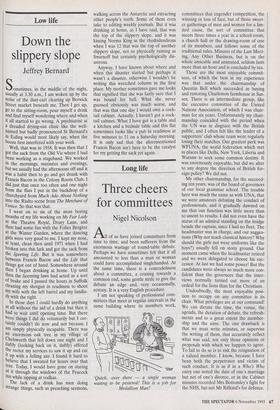Long life
Three cheers for committees
Nigel Nicolson
Al of us have joined committees from time to time, and been sufferers from the enormous wastage of round-table debate. Perhaps we have sometimes felt that it all amounted to less than a man or woman could have accomplished singlehanded. At the same time, there is a comradeliness about a committee, a coaxing towards a common end, some gentle strife to give the debate an edge and, very occasionally, ecstasy. It is a very English procedure.
I am not speaking of professional com- mittees that meet at regular intervals in the same building where its members work, 'Quick, over there — a single woman waiting to be pestered! This is a job for Medallion Man!' committees that engender competition, the winning or loss of face, but of those sweet- er gatherings of men and women for a lim- ited cause, the sort of committee that meets three times a year in a school-room, a church hall or the drawing-room of one of its members, and follows some of the traditional rules, Minutes of the Last Meet- ing, Any Other Business, but is on the whole amicable and animated, seldom lasts more than an hour and is concluded by tea.
Those are the most enjoyable commit- tees, of which the best in my experience was that under the chairmanship of Quentin Bell which succeeded in buying and restoring Charleston farmhouse in Sus- sex. There is an intermediate group, like the executive committee of the United Nations Association, of which I was chair- man for six years. Unfortunately my chair- manship coincided with the period when the UN was in disgrace with the British public, and I often felt like the leader of a supporters' club whose team were regularly losing their matches. Our greatest perk was WFUNA, the world federation which met in places like Delhi, New York, Liberia and Warsaw to seek some common destiny. It was enormously enjoyable, but did we alter to any degree the direction of British for- eign policy? We did not.
My other chairmanship, for the succeed- ing ten years, was of the board of governors of our local grammar school. The trouble here was much the same as with UNA, that we were amateurs debating the conduct of professionals, and it gradually dawned on me that our function was little more than to assent to results. I did not even have the status of an admiral standing on the bridge beside the captain, since I had no fleet. The headmaster was in charge, and our sugges- tions (Why not teach classical history? Why should the girls not wear uniforms like the boys?) ugually fell on stony ground. Our moment came when the headmaster retired and we were delegated to choose his suc- cessor. At last we had some power! But the candidates were always so much more con- fident than the governors that the inter- views normally turned out more of an ordeal for the lions than for the Christians.
Undoubtedly, the most enjoyable posi- tion to occupy on any committee is its chair. What privileges are at our command! We can dictate the time, the venue, the agenda, the duration of debate, the refresh- ments and to a great extent the member- ship and the aims. The one drawback is that we must write minutes, or supervise the writing of them, that accurately reflect what was said, not only those opinions or proposals with which we happen to agree. To fail to do so is to risk the resignation of a valued member. I know, because I have been both the perpetrator and victim of such conduct. It is as if in a Who's Who entry one noted the date of one's marriage but not of one's divorce, or in the Cabinet minutes recorded Mrs Bottomley's fight for the NHS, but not Mr Rifkind's for defence.










































































 Previous page
Previous page